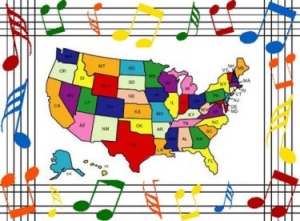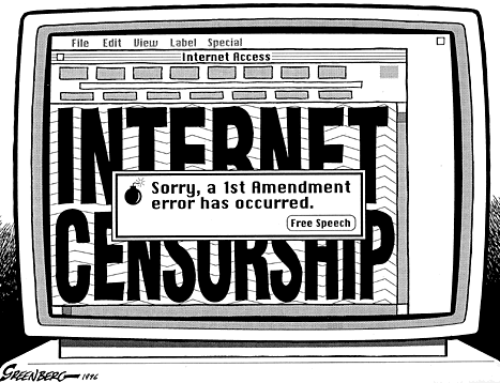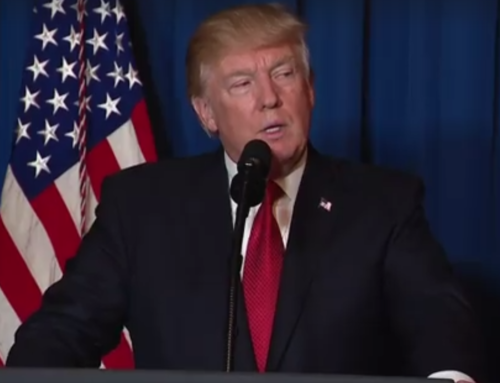What do Neil Young, REM, and Survivor have in common? Yes, all of them have created memorable, anthemic songs in their respective careers. Relevant to the First Amendment, however, their music has been used without permission in political campaigns just this year.
Neil Young called Donald Trump out on using Rocking in the Free World during one of his appearances on the campaign trail. REM pulled no verbal punches in making it clear to the same candidate that his use of It’s the End of the World As We Know It (And I Feel Fine) was not acceptable.
In addition, Survivor ordered a cease and desist to Mike Huckabee, at whose press event Eye of the Tiger was used to herald Kim Davis’s release from jail for her stance against issuing marriage licenses to gay couples. Huckabee’s presence, as well as his ostensible political motives in supporting the notorious Kentuckian Clerk of Rowan County, implied strongly that it was a tactic to boost his campaign.
This is not unusual. John Mellencamp, Don Henley, Tom Petty, Talking Heads (via David Byrne), Twisted Sister, Rage Against the Machine, Katrina and the Waves, Green Day, Jackson Browne, Joe Walsh, and most famously, Heart and Bruce Springsteen, have all been outspoken about unauthorized use of their works during campaign events over the years.
Now, what do all these musical artists have in common? Every offending political candidate who misappropriated those artists’ songs just so happened to be Republican.
That is not to say that members of the GOP are the only perpetrators. Barack Obama was asked by Cyndi Lauper to not use her song True Colors. Sam Moore, the tenor of the soul duo, Sam and Dave, did the same with Hold On! I’m Coming.
What makes Lauper and Moore different from the other artists? Their objections were not based on their own political views as it was for the others. In fact, Lauper made it clear that she supported Obama and just had issue with the manner in which her song was used—in a commercial to discredit Mitt Romney. Her contention was that basically, Romney had enough rope to hang himself without the help of her creation. While Moore claimed to not support any candidate, he subsequently performed with other artists at a rally in Obama’s honor. It is easy to infer that Moore was at least not offended by Obama’s politics, and actually sent a very gracious letter asking him to not use his song.
Again, what do these artists have in common? Every one of them is within their Constitutional rights to object. Sometimes, they have a right to sue. However, the legal ramifications are not the focus here.
First things first, it may be important to establish possible wrongdoing on the part of the political candidates in question. Did the campaign parties in question violate any licensing or performance rights in the use of those songs?
If a politician wants to use a song for a commercial or video, the musician’s publisher or record label needs to be contacted for permission. There is a legally binding contract that is required to acquire the right to use the piece in conjunction with that person’s campaign. Otherwise, they could be sued for wrongful use.
For public campaign events and political rallies, which are more along the lines of the aforementioned examples, most venues have secured blanket public performance licenses. If the campaign intends to use the same song as a theme, of sorts, it may be more secure to obtain those public performance licenses independent of the venues.
In deference to these political campaigns, it must be stressed that it appears they followed the rules up to this point. Beyond that, it gets tricky. That is where it becomes a First Amendment issue.
First Amendment rights are predicated on the principle that no one can infringe on the other. In other words, you can exercise your right to freedom of speech as long as it does not interfere with another person’s right to the same.
Politicians have the right to use the tools they feel are necessary to further their campaigns. Freedom of speech grants that. In addition, political speech and, to a lesser extent, petition and assembly protections may apply. Commercial speech could be argued, as the campaign is promoting an idea for the “profit” of being elected. It is a stretch. Yet, that does not secure as much protection as other forms of speech.
On the flipside, songwriters have the right to decide how their work is used and interpreted. When a political campaign uses a song, it does carry the artist’s image and brand along with it. For better or worse, an endorsement of that candidate is possibly implied, and probably inferred by those who view or listen to the candidate’s message.
This is when the artist, regardless of politics, makes it very loud and clear that their song was used without their permission. In those cases, they are absolutely within their rights to protest, and possibly seek redress through legal channels.
There is a piece of the First Amendment that doesn’t always come to mind: Defamation. Someone can sling arrows under the guise of free speech; the one on the receiving end can retaliate. That is, if the wronged party can prove defamation.
There are three claims the artist can make in defense: The right of publicity, the Lanham Act, and false endorsement. So as not to get bogged down in legalese, all three are variations of the same premise—artists have rights to control their brand and how it is perceived. Anyone who infringes on those rights must cease and desist on demand and, depending on the circumstances, may face a lawsuit.
Unfortunately, more times than not, it is difficult for the artists to do much more than merely publicly complain. They exercise their freedom of speech by doing loudly and long enough to restore the image they’ve cultivated.
Why does this continue to happen, and to address an earlier observation, why are Republican candidates called out far more often for it than Democrats? Well, that’s an easy one to answer. Artists tend to be more liberal in their social and political views. Frankly, many find conservative politics distasteful.
Admittedly, Republicans (or at least their campaign workers) can be a tad obtuse when it comes to interpreting an artist’s work. Ronald Reagan—a supporter of war—used Springsteen’s Born in the USA for his campaign. On the surface, it seems an apt usage, right? Reagan was proud to be American and promoted the same of its citizens. The problem is that the song was anything but that. It was a diatribe against this country’s treatment of Vietnam veterans and the military-industrial complex in general—something near and dear to hawkish conservatives but not to a large majority of many musicians.
Neil Young’s Rockin’ in the Free World is a rant against war and capitalism. The billionaire Donald Trump reeks of the bellicosity of both, yet he thought it was a great campaign song. Wrong.
Another famous misappropriation is Sarah Palin’s use of Heart’s Barracuda. Palin’s cutesy attempt at promoting her image as a candidate with teeth left Ann and Nancy Wilson not at all amused. (Not to mention, the song is rumored to be sexual in nature).
Huckabee’s use of Survivor’s Eye of the Tiger for a rally in Kim Davis’s honor could be the most egregious misusage in recent memory. The band members were furious that the song most notable as a positive anthem for perseverance for the common people was used to promote a socially damaging, conservative ideology.
These are just a few detailed examples of a leitmotif. In the case of Obama’s campaign, the songs were not misinterpreted, per se; the artists simply didn’t want them to be associated with any political purpose.
Before this article is interpreted as containing a liberal agenda, make no mistake. These rights are equal regardless of what side the political fence they are exercised. Yes, Republicans tend to pop up in the news more for this offense. It is not necessarily because they are less respectful and are more cavalier about the laws of the land (although liberals could argue that point quite persuasively using this subject as an example). What it may very well come down to is that artists may look the other way when Democrats they support do the same. Once again, that is their right.
Ted Nugent—famously conservative and anti-Obama—could issue a cease and desist to Hillary Clinton if she used Cat Scratch Fever as her walkout song. It would be hilarious if that actually happened, but that is purely hypothetical here. Nugent could be as vocal as every liberal musician, because Clinton would be tampering with his image and, in his eyes, implying his support of her candidacy despite his strongly held political leanings.
However, the likelihood of her doing so is essentially nonexistent, whereas it seems almost commonplace on the other side of the political spectrum. Nevertheless, it’s vital that politicians of all persuasions respect the rights of “The People,” for whom it is their job to serve the interests of.
This controversy can be avoided if campaigns write their own music, go tuneless or, more realistically, just actually ask the artist. It is one of the most powerful forms of communication, after all.







Leave A Comment